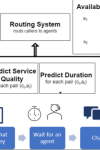Machine-learning based routing of callers in an Israeli mental health hotline

המחקר החדש מציע שיטות חדשות המבוססות על שימוש באלגוריתמי למידה, עיבוד שפה ואופטימיזציה כדי לשפר את השירות של ער"ן על ידי התאמה טובה יותר של פונים למתנדבים
Background: Mental health contact centers (also known as Hotlines) offer crisis intervention and counselling by phone calls and online chats. These mental health helplines have shown great success in improving the mental state of the callers, and are increasingly becoming popular in Israel and worldwide. Unfortunately, our knowledge about how to conduct successful routing of callers to counselling agents has been limited due to lack of large-scale data with labeled outcomes of the interactions. To date, many of these contact centers are overwhelmed by chat requests and operate in a simple first-come-first-serve (FCFS) scheduling policy which, combined, may lead to many callers receiving suboptimal counselling or abandoning the service before being treated. In this work our goal is to improve the efficiency of mental health contact centers by using a novel machine-learning based routing policy.
Methods: We present a large-scale machine learning-based analysis of real-world data from the online contact center of ERAN, the Israeli Association for Emotional First Aid. The data includes over 35,000 conversations over a 2-years period. Based on this analysis, we present a novel call routing method, that integrates advanced AI-techniques including the Monte Carlo tree search algorithm. We conducted an experiment that included various realistic simulations of incoming calls to contact centers, based on data from ERAN. We divided the simulations into two common settings: standard call flow and heavy call flow. In order to establish a baseline, we compared our proposed solution to two baseline methods: (1) The FCFS method; and (2) a greedy solution based on machine learning predictions. Our comparison focuses on two metrics - the number of calls served and the average feedback of the callers (i.e., quality of the chats).
Results: In the preliminary analysis, we identify indicative features that significantly contribute to the effectiveness of a conversation and demonstrate high accuracy in predicting the expected duration and the callers' feedback. In the routing methods evaluation, we find that in heavy call flow settings, our proposed method significantly outperforms the other methods in both the quantity of served calls and average feedback. Most notably, we find that in the heavy call flow settings, our method improves the average feedback by 24% compared to FCFS and by 4% compared to the greedy solution. Regarding the standard-flow setting, we find that our proposed method significantly outperforms the FCFS method in the callers' average feedback with a 12% improvement. However, in this setting, we did not find a significant difference between all methods in the quantity of served-calls and no significant difference was found between our proposed method and the greedy solution.
Conclusion: The proposed routing policy has the potential to significantly improve the performance of mental health contact centers, especially in peak hours. Leveraging artificial intelligence techniques, such as machine learning algorithms, combined with real-world data can bring about a significant and necessary leap forward in the way mental health hotlines operate and consequently reduce the burden of mental illnesses on health systems. However, implementation and evaluation in an operational contact center is necessary in order to verify that the results replicate in practice.
תאריך עדכון אחרון : 15/06/2022



